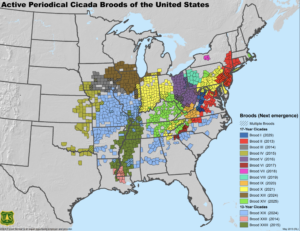Will Cicadas Sing the Song of Their People in 2021?
go.ncsu.edu/readext?791605
en Español / em Português
El inglés es el idioma de control de esta página. En la medida en que haya algún conflicto entre la traducción al inglés y la traducción, el inglés prevalece.
Al hacer clic en el enlace de traducción se activa un servicio de traducción gratuito para convertir la página al español. Al igual que con cualquier traducción por Internet, la conversión no es sensible al contexto y puede que no traduzca el texto en su significado original. NC State Extension no garantiza la exactitud del texto traducido. Por favor, tenga en cuenta que algunas aplicaciones y/o servicios pueden no funcionar como se espera cuando se traducen.
Português
Inglês é o idioma de controle desta página. Na medida que haja algum conflito entre o texto original em Inglês e a tradução, o Inglês prevalece.
Ao clicar no link de tradução, um serviço gratuito de tradução será ativado para converter a página para o Português. Como em qualquer tradução pela internet, a conversão não é sensivel ao contexto e pode não ocorrer a tradução para o significado orginal. O serviço de Extensão da Carolina do Norte (NC State Extension) não garante a exatidão do texto traduzido. Por favor, observe que algumas funções ou serviços podem não funcionar como esperado após a tradução.
English
English is the controlling language of this page. To the extent there is any conflict between the English text and the translation, English controls.
Clicking on the translation link activates a free translation service to convert the page to Spanish. As with any Internet translation, the conversion is not context-sensitive and may not translate the text to its original meaning. NC State Extension does not guarantee the accuracy of the translated text. Please note that some applications and/or services may not function as expected when translated.
Collapse ▲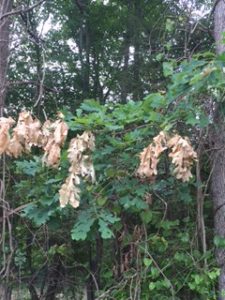
Cicada female cuts the bark near the end of branches to create a place to lay her eggs. This in turn causes the ends of the branches to die.
You may have heard in the news about the 17-year’ periodical cicada’ Brood X that will be making noise in certain areas of the country. That is true. In places like Washington DC, north Georgia, east Tennessee, Indiana, and Ohio the noisy insects will create a noise as loud as a lawnmower, ruining outdoor events and disturbing patio sitters.
Will we see these noisome insects in western North Carolina in numbers high enough to ruin outdoor events? Luckily, no. Our 17-year ‘periodical cicadas’ are part of Brood VI which is not due to emerge until 2034. Will we hear cicadas this year? Yes, some cicadas emerge each year. The ones that emerge every year are called the ‘dog day’ or ‘annual cicadas’. You can differentiate them from ‘periodical cicadas’ because the ‘periodical cicadas’ have distinct red-orange eyes and annual cicadas have dark eyes and green to brown bodies.
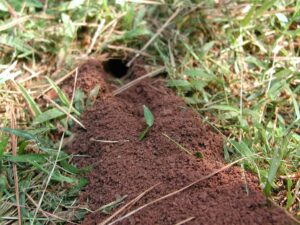
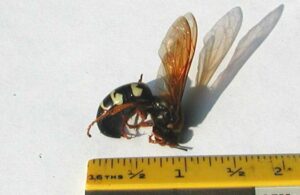 Each year I get questions about huge wasps living in holes in the ground near homes. The ‘cicada killer wasp’ hunts cicadas. It stings and then captures the cicada and hauls them back to the wasp nest in the ground. Cicada killer wasps are solitary insects and generally do not sting people.
Each year I get questions about huge wasps living in holes in the ground near homes. The ‘cicada killer wasp’ hunts cicadas. It stings and then captures the cicada and hauls them back to the wasp nest in the ground. Cicada killer wasps are solitary insects and generally do not sting people.
Cicadas spend 13 or 17 years underground as larvae feeding on tree 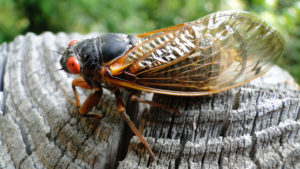 roots. They emerge as a group on certain years usually May-July. The adults only live about 4-6 weeks. The adults mate and the females lay eggs in slits they cut into tree branches. Larvae hatch and eventually make it to the ground where they will burrow and begin the 13 or 17-year cycle again.
roots. They emerge as a group on certain years usually May-July. The adults only live about 4-6 weeks. The adults mate and the females lay eggs in slits they cut into tree branches. Larvae hatch and eventually make it to the ground where they will burrow and begin the 13 or 17-year cycle again.





